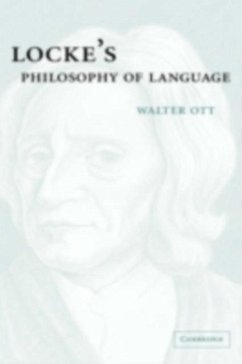
Philosophy and Allotment : John Locke's influence on Henry L. Dawes (eBook, PDF)
Versandkostenfrei!
Sofort per Download lieferbar
40,95 €
inkl. MwSt.
Weitere Ausgaben:

PAYBACK Punkte
20 °P sammeln!
This book provides a new perspective for examining the Native policies of the late nineteenth century. It centers on the figure of Henry Laurens Dawes, and more specifically, on the conceptual roots of his views on allotment, education and assimilation. These roots are grounded in John Locke's epistemology and pedagogy. Through a philosophical analysis of Dawes' ideas and policies, the book provides a new approach to arrive at a better understanding of an important historical process. In this regard, an often-overlooked link between philosophy and history is clarified, helping philosophers, hi...
This book provides a new perspective for examining the Native policies of the late nineteenth century. It centers on the figure of Henry Laurens Dawes, and more specifically, on the conceptual roots of his views on allotment, education and assimilation. These roots are grounded in John Locke's epistemology and pedagogy. Through a philosophical analysis of Dawes' ideas and policies, the book provides a new approach to arrive at a better understanding of an important historical process. In this regard, an often-overlooked link between philosophy and history is clarified, helping philosophers, historians and other scholars in their quest for knowledge. This book clarifies the impact of philosophical ideas on historical conceptions, and by studying Dawes, also addresses the reflection behind a major historical process. Political and social philosophers, as well as historians of ideas and of Native policies, will greatly benefit from this concise book.
Dieser Download kann aus rechtlichen Gründen nur mit Rechnungsadresse in A, B, BG, CY, CZ, D, DK, EW, E, FIN, F, GR, HR, H, IRL, I, LT, L, LR, M, NL, PL, P, R, S, SLO, SK ausgeliefert werden.












